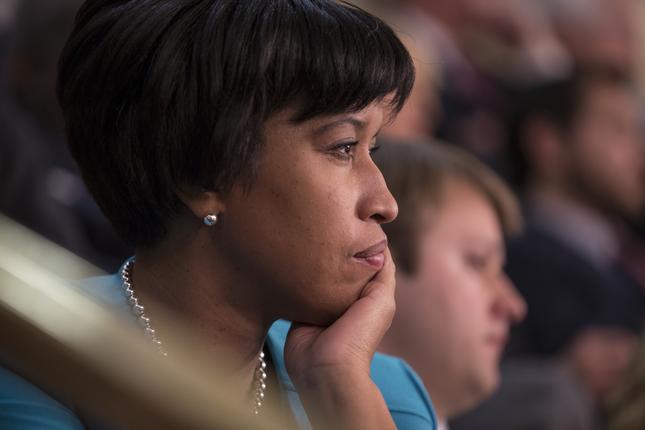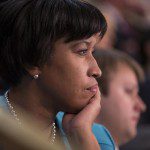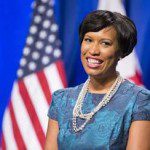Meet the New Boss
By • April 13, 2015 0 1100

Ever since Muriel Bowser – not unexpectedly – won the November general election, becoming the District of Columbia’s second female mayor and the second-youngest of either sex, she has been enjoying an extended honeymoon with the city’s residents and, by and large, the media.
Honeymoons are common for newly elected officials, though their duration tends to be unpredictable.
In a way, the whole process imitates how people end up married. There is that first, exciting meeting and flush of curiosity among the public, the media and the new candidate, followed by an odd kind of courtship played out in town forums and debates (the gotcha-eager media watching every step). Then there’s commitment, as the winning candidate makes promises that she or he may or may not keep. An engagement party – in the form of inaugural bashes, ceremonies and parades – makes things official. And they do solemnly swear.
But what happens next is never quite what anybody – candidate, constituents or the press – thinks it is going to be. Right from the start, life comes barreling down, in some cases almost on the morning after the morning after (Mayor Vincent Gray, anyone?).
“Expect the unexpected,” said the 42-year-old Bowser of her job. On March 20, a busy day at the mayor’s office, she had just settled down for an interview with The Georgetowner. “You have to be ready for surprises.”
It was interesting to watch the process as – with an early announcement, back in spring 2013 – Bowser moved from being a Ward 4 council member to a citywide candidate.
Over that period of time, we’ve had the opportunity to observe her on the campaign trail, where she grew steadily in confidence against a seasoned group of campaigners, including the scandal-plagued incumbent mayor Vincent Gray. She won the Democratic primary going away.
Her general election campaign against Independents David Catania and Carol Schwartz was different in tone and in practice. She became a candidate who was very much in control of her campaign, and the campaign in general. We talked to her then at a crowded, millennial-oriented coffeehouse in Petworth, a scene representative of the changes the city was experiencing. If anything, she was more confident than ever, dismissing questions about the possibility of a tight election.
“To me,” Bowser said then, even after limiting the playing field to four debates, “the biggest thing was being able to meet and talk with the people across the diverse neighborhoods of this city. I know who I am and where I come from, but here, in this process, I saw and engaged the whole city. It was revealing to me how much all of the people in this city have in common, and, at the same time, the diversity of hopes, needs, dreams – the resources of the same people.”
We saw Bowser build her transition team – which included former mayors Marion Barry, Sharon Pratt, Anthony Williams and Adrian Fenty – and later become one of the chief mourners for Barry, who passed away unexpectedly and to much citywide sorrow in November.
We watched her being sworn in along with a number of new members of the District Council (Bowser called them NKOTBs, New Kids on the Block), as well as the District’s first elected attorney general, Karl Racine, who ruled that the mayor’s $20-million initiative to empower young boys and men of color passed constitutional muster.
We sat down with her for an interview last month, then watched her deliver a rousing hope-filled, project-filled, initiative-filled and slogan-filled State of the District Address March 31 at the historic Lincoln Theatre, right next to a D.C. icon, Ben’s Chili Bowl, on the U Street Corridor. Outside, demonstrators rallied, calling for more affordable housing, more help for the homeless and the protection of neighborhoods.
There are several reasons for the honeymoon that, despite the demonstrators, Bowser is experiencing. One of them is plainly the growth of her public persona. From being a relatively reserved council candidate, mentored and picked by Fenty, she has grown to be – over the course of the extended campaigns, her victory and her first three months in office – almost omnipresent in the public eye and the media. She appears to relish that part of the job, and doesn’t intend to change it.
For instance, she moved to more approachable digs on the third floor of the Wilson Building, with a view – from airy, brightly lit and modern rooms – of Pennsylvania Avenue, the Willard Hotel, the National Theatre and buses rolling along the boulevard. On a table in her office sit Barack Obama’s “Audacity of Hope” and Marion Barry’s autobiography, “Mayor For Life.”
“It’s a conscious decision to be closer to everything,” Bowser said. “Sometimes, the office can isolate you from staff – and real people.”
To all appearances, she was ready and eager to take on the work of being mayor. “I’m ready to go to work,” she said at her inauguration. “But the reality is that it’s a sobering, humbling experience to deal with the daily tasks, the duties, the things that surprise.” She reiterated: “Expect the unexpected.”
In the first month of her tour of duty, there were not one, but several, winter storms that closed schools and made for an endless series of decisions about deployment, preparedness and resources. Then there was the fatal fire at the L’Enfant Plaza Metro station, putting both Metro and the D.C. Fire and Emergency Medical Services Department under scrutiny. Bowser was emphatic, saying that the D.C. departments had acted professionally and appropriately.
Later, she hired Gregory Dean, retired chief of the Seattle Fire Department, as the District’s new fire chief. During an interview with The Georgetowner, Bowser said that the problems at the fire department – especially relating to its EMS component – were “sobering.”
During her first (almost) hundred days in office, Bowser seems to have been everywhere. Searching for budget ideas, she held four community forums throughout the city. She traveled to Texas, to New York City – and got a favorable bond-rating increase – and to San Francisco for a fruitless push to host the Olympics. And she made sure that residents knew what she was up to, with newsletters, emails and a hefty social-media presence.
“We are going to be the most transparent administration that you can possibly be,” Bowser said.
In the new position, her life has changed considerably. What does she miss? “Driving myself where I want to go, when I want to go,” she said. “Did you ever want some Cherry Garcia ice cream and just go get it? I used to like just going around the city, driving around, meeting people, checking things out. That can’t be done anymore, and I understand that.” To relax from the stressors of her new job, she has begun to allow herself some time off, such as a weekly massage at the Four Seasons.
She readily acknowledged being “a hometown girl,” adding, “I was raised in Ward 4 in a large family. Our parents made sure we had what was needed. We did not go hungry. We went to good schools, and we got our education.” Her higher education reflects her varied interests: a bachelor of arts in history from Chatham College, a master’s degree in public policy from American University.
In many ways, Bowser is all about the future, even while acknowledging the contributions of people like Barry and earlier mayors and leaders.
“The city’s changing enormously,” she said. “We have to make sure that we don’t lose people because they can no longer afford to live here. But, you know, when we’re talking about ‘One City,’ we’re talking about getting the neighborhoods to pull together. It’s not about divisions in race, or money, even. It’s about pulling together.”
Now, the mayoral city slogan is: “We are Washington, D.C.”
“The city council is no longer the city council of the past,” she said. “We have a number of new people on the council who are young, smart, able and imaginative. Frankly, their talents should be used to head committees that are now part of the Committee of the Whole.” A veteran of the council herself, Bowser said that she sees this arrangement as a better division of work: “I hope they revisit the organization of the council.”
Like many politicians, she seems to have a preference for talking in slogans, peppered with the acronyms of Twitter and Facebook.
In her State of the District Address, titled “Creating Pathways to the Middle Class,” the middle-class thematic came up a number of times, none more moving and pragmatic than when Bowser described the world in which she grew up, raised by middle-class parents.
“My parents bought their first home in 1960, when the average price of a home was $15,000. Today, it’s $500,000,” she said. “We have to make sure that if we’re going to be a city where families can stay and grow, we must do more to create opportunities for them. It always means creating pathways to the middle class.”
She used the phrase “fresh start” more than once – although not in terms of the streetcar project to which she committed $350 million more so that it would reach Georgetown, among other places. She rattled off a series of projects: building new housing, providing affordable housing, changing the landscape of Anacostia, preserving and expanding the Mayor Marion S. Barry Summer Youth Employment Program, new education and workforce-training efforts, programs to get and keep residents by putting them to work and letting them succeed.
“Because, we know, when they succeed, we all succeed,” she said several times, using another oratorical trope in her growing rhetorical toolbox.
Most of her measures were greeted with loud applause, the 50 or so protesters outside the theater notwithstanding.
“We are a growing city, a world-class city,” Bowser said. “But we face a large $250-million deficit, which requires tough decisions. But I will balance that budget, with the help of the residents of this city, and I’ll deliver it tomorrow [April 2] to the city council for its approval.”
Which she did. In order to balance the budget, the tough decisions included increasing sales taxes and cutting funds for the University of the District of Columbia and Medicare payments.
No doubt there will be arguments over these and other choices. But for now, Mayor Muriel Bowser is still on a kind of honeymoon. Even the realities of the $12.9-billion 2016 budget won’t change that – yet.
Mayor Muriel Bowser: Get to Know Her
Muriel Elizabeth Bowser, Mayor of the District of Columbia, was born Aug. 2, 1972, in Washington, D.C. She traces her Washington roots through five generations. Her middle name – Elizabeth – is from her maternal great-grandmother, Elizabeth Brown.
Bowser grew up in North Michigan Park, the youngest of five children. Her father, Joe, an advisory neighborhood commissioner, has been a community activist since the mayor was a little girl. “His legacy is part of her,” Bob King, the city’s longest-serving advisory neighborhood commissioner and a family friend, told the Washington Post.
When she was born, her closest sibling in age was Mark, 10 years old. Twins Martin and Marvin were about to begin high school and the eldest daughter, Mercia, was getting ready for college. Her mother, Joan, recalled that Muriel grew up almost as an only child.
She graduated in 1990 from Elizabeth Seton High School, an all-girls Catholic high school in Bladensburg, Maryland. She earned a bachelor of arts degree in history from Chatham College in Pittsburgh and a master’s degree in public policy from American University. Before entering politics, she worked for State Farm Insurance.
She began her political career in 2004 when she ran for the local ANC and represented the neighborhood of Riggs Park, where she bought a house several years earlier. In 2006, she was re-elected.
When Adrian Fenty became mayor in 2007, Bowser was the campaign coordinator for Ward 4, which Fenty represented in the District Council. In a special election to fill his seat, she won with 40 percent of the vote. In 2008 and 2012, Bowser was re-elected, winning with 97 percent of the vote both times.
Bowser was chairwoman of the Council’s Committee on Economic Development, which helped to create affordable housing, passed legislation to build a new soccer stadium and secured a portion of the Walter Reed campus for D.C. As chairwoman of the Committee on Government Operations, she worked to pass comprehensive ethics reform, improve the efficiency and safety of the Metro system and increase transparency in government contracting.
On March 23, 2013, Bowser announced that she would run for mayor in the 2014 election. She won the Democratic primary on April 1, 2014, with 43 percent (42,045 votes) of the vote versus incumbent Mayor Vincent Gray’s 33 percent (31,613 votes).
In the general election, Bowser won with 80,824 votes. She took office Jan. 2 as D.C.’s seventh elected mayor.
- Mayor Muriel Bowser at the 2015 State of the Union. | Photo by Erin Schaff.
- Nora Birch



